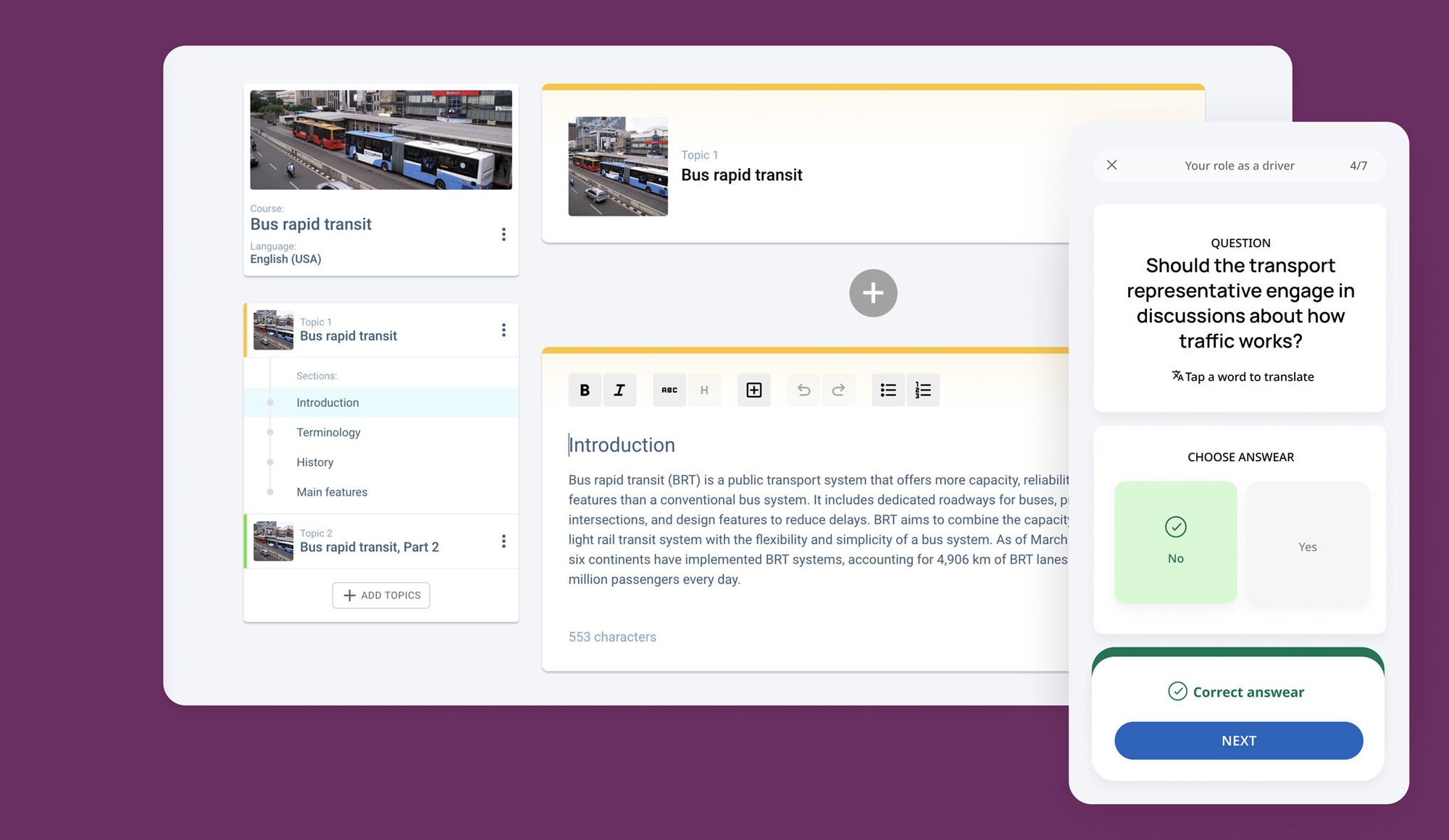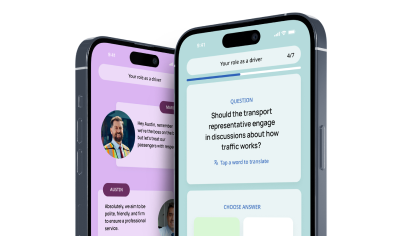Artificial Intelligence (AI) has become a game-changer in business, revolutionising how organisations operate and streamlining various processes. With its ability to automate repetitive tasks, enhance decision-making, and optimise resource management, AI is an invaluable tool for frontline managers. This article will explore how frontline managers can leverage AI to streamline business processes and achieve greater efficiency.
Understanding AI and its relevance to business processes
Let's first grasp a basic understanding of what AI is and why it is relevant. AI is the simulation of human intelligence in machines that are programmed to think, learn, and problem-solve like humans. It encompasses various technologies, including machine learning, natural language processing, and robotics. AI has the potential to transform businesses by automating tasks, improving decision-making, and enhancing customer experiences.
Artificial Intelligence, often abbreviated as AI, has been a topic of great interest and debate in recent years. The concept of AI dates back to ancient times, with early ideas about intelligent machines found in Greek mythology and medieval alchemy. However, it was in the 20th century that AI began to take shape as a field of study and research.
One of the key drivers behind the rapid development of AI in recent years has been the exponential growth in computing power and the availability of vast amounts of data. These factors have enabled AI systems to learn from data, recognise patterns, and make decisions with increasing accuracy and efficiency. As a result, AI is now being applied across a wide range of industries, from healthcare and finance to retail and manufacturing, revolutionising business operations and driving innovation.
Identifying areas where AI can streamline business processes
Now that we understand the concept of AI, let's explore the areas where frontline managers can harness its power to streamline their business operations.
1. Automation of repetitive tasks
One of AI's significant advantages is its ability to automate repetitive and mundane tasks, freeing up valuable time for employees to focus on more strategic activities. By leveraging AI-powered tools, frontline managers can automatically eliminate manual data entry, generate reports, and streamline administrative tasks.
2. Enhanced decision-making
AI can process large volumes of data quickly and accurately, enabling frontline managers to make data-driven decisions. By analysing historical data, AI algorithms can identify patterns, trends, and insights that may not be apparent to human decision-makers. This empowers managers to make informed choices, minimise risks, and improve overall business performance.
3. Improving customer service
Customer service is a critical aspect of any business, and with AI, frontline managers can take it to new heights. AI-powered chatbots, for example, can handle customer inquiries, provide personalised recommendations, and resolve common issues 24/7. This enhances the customer experience and reduces the workload on frontline staff, allowing them to focus on more complex customer needs.
4. Optimising resource management
Effective resource management is essential for business success. AI can help frontline managers track inventory levels, forecast demand, and optimise supply chain operations. By analysing data in real-time, AI algorithms can identify inefficiencies, suggest improvements, and help make timely decisions to ensure optimal resource allocation.
5. Enhancing employee productivity
Furthermore, AI can also play a crucial role in enhancing employee productivity. Using AI-powered tools, frontline managers can monitor employee performance, identify areas for improvement, and provide personalised training and development opportunities. This not only helps boost employee morale but also contributes to the overall growth and success of the business.
6. Assisting in risk management
AI can also assist frontline managers in risk management. By analysing vast amounts of data, AI algorithms can identify potential risks and predict future challenges, allowing managers to implement mitigation strategies proactively. This proactive approach minimises the impact of risks and helps maintain a competitive edge in the market.
Practical tips for frontline managers on leveraging AI
Now that we have explored the potential of AI in streamlining business operations, let's discuss some practical tips for frontline managers to make the most of AI technology.
1. Identify key pain points
Start by identifying the areas in your business that need improvement. Analyse the pain points, bottlenecks, and inefficiencies that could benefit from AI automation or optimisation.
2. Choose the right AI tools
Not all AI tools are created equal, and choosing the right ones for your needs is crucial. Consider factors such as functionality, scalability, ease of integration, and cost-effectiveness when selecting AI tools for your business.
3. Implement AI in phases
Implementing AI in business operations can be overwhelming, especially for frontline managers. To ensure a smooth transition, consider implementing AI in phases, starting with small-scale projects and gradually expanding the scope as the team becomes comfortable with the technology.
4. Train your team
While AI is designed to automate tasks, training your team to work alongside AI systems is still important. Provide training to frontline staff, helping them understand the capabilities of AI and how it can augment their productivity.
5. Measure and analyse performance
Regularly measure and analyse the performance of AI-driven processes to track their impact on business outcomes. This will help you identify areas of improvement, refine your AI strategies, and ensure you are getting the desired results.
6. Foster a culture of innovation
Encourage a culture of innovation within your organisation by promoting collaboration, experimentation, and openness to new ideas. This will create an environment where frontline managers and employees feel empowered to explore AI technologies and find creative ways to optimise business operations.
By following these practical tips and fostering a culture of innovation, frontline managers can effectively leverage AI technology to optimise business processes and drive sustainable growth.
Real-world examples of AI in action
Let's examine a few real-world examples to further illustrate the practical applications of AI in streamlining business processes.
Artificial Intelligence (AI) has revolutionised various industries, offering innovative solutions to complex problems. One such industry that has greatly benefited from AI is the healthcare sector. AI-powered systems are used to analyse medical images, predict patient outcomes, and even assist in drug discovery. By harnessing the power of AI, healthcare providers can deliver more accurate diagnoses, personalised treatment plans, and improved patient care.
1. Automating inventory management
A retail company implemented an AI-driven inventory management system that predicted demand based on historical data, weather patterns, and sales trends. This allowed frontline managers to optimise stock levels, reduce overstocking and stockouts, and improve overall inventory turnover.
Moreover, AI can also be used in agriculture to enhance crop yield and sustainability. By analysing soil conditions, weather patterns, and crop data, AI algorithms can provide farmers with valuable insights to optimise planting schedules, irrigation practices, and pest control measures. This not only increases productivity but also promotes environmental conservation.
2. Enhancing customer support
A telecommunications company integrated AI-powered chatbots into their customer support system. These chatbots could handle various customer inquiries, provide immediate responses, and escalate complex issues to human agents when necessary. This improved response times, increased customer satisfaction, and reduced reliance on frontline support staff.
Furthermore, AI is making significant educational strides by personalising student learning experiences. Adaptive learning platforms powered by AI algorithms can assess individual student performance, tailor educational content to their needs, and provide real-time feedback. This approach not only enhances student engagement but also improves learning outcomes.
3. Optimising workforce scheduling
A healthcare organisation leveraged AI algorithms to optimise its workforce scheduling process. By analysing historical patient data, staff availability, and requirements, the system generated optimised schedules that ensured the right staff with the right skills were assigned to the right shifts. This improved staff utilisation reduced overtime costs, and enhanced patient care.
In addition to healthcare, AI is also transforming the transportation industry by enabling the development of autonomous vehicles. Self-driving cars with AI technology can navigate roads, interpret traffic signals, and make split-second decisions to ensure passenger safety. This advancement not only promises to revolutionise the way we travel but also has the potential to reduce accidents and traffic congestion.
Challenges and considerations
While AI offers tremendous potential, frontline managers must be aware of the challenges and considerations associated with its implementation. For example, AI systems require accurate and reliable data to perform effectively. Data quality and integrity are essential to obtaining valuable insights and making informed decisions. Collecting and preparing data for AI analysis can be time-consuming and resource-intensive. Frontline managers may need to invest in data management tools and expertise to streamline this process and maximise the benefits of AI technology.
Also, AI implementation may require initial investment in infrastructure, training, and integration with existing systems. Frontline managers should evaluate costs and benefits carefully before committing to AI initiatives.
Furthermore, integrating AI systems with existing workflows and processes can pose challenges regarding compatibility and user adoption. Managers must provide adequate training and support to ensure a smooth transition and optimal use of AI capabilities.
Lastly, ethical considerations and data privacy should be addressed proactively. Guidelines and protocols should be established to safeguard sensitive information and ensure compliance with data protection regulations.
15 ways frontline managers can use AI in business process enhancement
- Automate repetitive administrative tasks, such as data entry and report generation.
- Improve decision-making by analysing large datasets and spotting trends.
- Enhance customer service through AI-powered chatbots and personalised recommendations.
- Optimise resource management by tracking inventory levels and forecasting demand.
- Streamline recruitment processes by utilising AI-powered applicant screening tools.
- Enable predictive maintenance by analysing equipment performance data.
- Improve sales forecasting accuracy by leveraging AI algorithms.
- Streamline procurement processes through automated supplier selection and optimisation.
- Optimise pricing strategies by analysing market data and consumer behaviour.
- Automate quality control processes by using AI-based image recognition systems.
- Enable predictive analytics for risk management and fraud detection.
- Improve employee engagement through personalised learning and development programs.
- Optimise project management by utilising AI-based scheduling and task allocation tools.
- Automate data analysis and generate actionable insights for process improvement.
- Streamline compliance processes using AI algorithms to detect anomalies and ensure regulatory adherence.
Frontline managers are crucial in implementing AI technologies to enhance business processes. By embracing AI, these managers can revolutionise tasks, increasing efficiency and productivity across various departments.
One key benefit of using AI in business process enhancement is the ability to harness machine learning algorithms to predict future trends and outcomes. By analysing historical data and patterns, frontline managers can make informed decisions backed by data-driven insights. This predictive capability can significantly improve the organisation's strategic planning and operational efficiency.
Discover how Lingio can transform your business learning experience
Ready to take your team's training and development to the next level? At Lingio, we combine the power of artificial intelligence with the excitement of gamification and the support of expert coaching to create an engaging and effective learning journey. Our AI employee training platform is designed to make skill acquisition as enjoyable and impactful as possible, ensuring your staff learn faster and retain more information. Take advantage of the opportunity to see how Lingio can streamline your business processes. Book a demo today and witness the innovative approach that Lingio brings to professional training and development.
FAQs
1. Can AI completely replace human employees?
No, AI is designed to augment human capabilities, not replace them. While AI can automate specific tasks and enhance decision-making, the human touch is still essential for complex problem-solving, creativity, and building relationships with customers and colleagues.
2. How can frontline managers ensure the ethical use of AI?
Frontline managers can ensure the ethical use of AI by establishing clear guidelines for data privacy, promoting transparency in AI decision-making algorithms, and involving employees in the AI implementation process. Regular review and monitoring of AI systems are crucial to identifying and addressing ethical concerns.
3. What are the limitations of AI in business processes?
AI is only as good as the data it is trained on. Only accurate or accurate data can lead to reasonable predictions and decisions. Additionally, AI may need help with complex decision-making that requires human judgment or contextual understanding. Continuous monitoring and evaluation are necessary to address these limitations and improve the effectiveness of AI-driven processes.
4. Is AI technology accessible to businesses of all sizes?
Yes, AI technology is becoming increasingly accessible to businesses of all sizes. From cloud-based AI platforms to off-the-shelf AI tools, various options can be tailored to a business's specific needs and budget. Small and medium-sized enterprises can start by identifying key areas where AI can bring value and gradually scale their AI initiatives as their capabilities and resources grow.
In addition to the above questions, several other factors must be considered when implementing AI in business processes. One such factor is the need for proper training and upskilling of employees. While AI can automate specific tasks, it requires skilled professionals to manage and optimise performance. Providing training programs and resources to employees can help them adapt to the changing landscape and make the most of AI technology.
Furthermore, it is essential to consider the potential impact of AI on the workforce. While AI can streamline processes and improve efficiency, it may also lead to job displacement in certain areas. Frontline managers should proactively address these concerns by fostering a culture of continuous learning and reskilling, ensuring that employees are equipped with the skills needed to thrive in an AI-driven environment.


Table of contents
Intro
Understanding AI and its relevance to business processes
Identifying areas where AI can streamline business processes
Practical tips for frontline managers on leveraging AI
Real-world examples of AI in action
Challenges and considerations
15 ways how frontline managers can use AI in business process enhancement
Discover how Lingio can transform your business learning experience
FAQs

